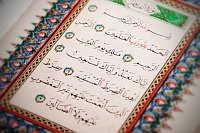The normal cycle of a human being is to sleep/rest at night and work in the day. Scientifically, the phenomenon of the body’s cycle is explained by a term called the circadian rhythm, which was made popular by scientists in the early 20th century. It means an approximate daily periodicity, a roughly-24-hour cycle in the biochemical, physiological or behavioral processes of living beings, including human beings. In simple words, what our body is supposed to do (rest or be active) at a given time.
The main factor that affects the circadian rhythm is the light accepted by a region in the brain (hypothalamus). However, the light that affects the circadian rhythm is highly specific (in wave length, intensity, and other attributes), and to no surprise, the corresponding attributes are found in no other than our own sun.
Allah the Almighty has said about this in The Qur’an in Surah (chapter) Yunuus verse 67:

Which can be approximately translated (according to Tafseer Al Jalalayn) as
“He it is Who made for you the night that you should rest therein, and the day to see. Surely in those are signs, indications of His Oneness, exalted be He, for folk who are able to hear (those who think deeply).”
Allah the Almighty has made it clear for us to use the night to rest, and the day to “see”. The word “see” here shows Allah’s define knowledge (revealed to our beloved Prophet nearly 1400 years ago) that it is indeed “light” that affects our cycle, similar to what has only been recently discovered using modern science. Note the precise manner in which Allah addressed this matter.

The amazing transition of night to day
In my laboratory here in Japan, everyone works on an average of more than 10 hours a day. Some from 8 a.m. to 11 p.m., some work shorter but there aren’t a few who work even longer. However, the majority stay disciplined and use the night for resting. This normal cycle doesn’t apply for everyone though, as there are some who prefer to work at night and sleep in the day. This actually reminds me of what I used to do in my undergraduate years, where I participated in events that sometimes went on until morning. At those times, I’d sleep in the morning, and get up at noon. To me, it felt terrible. I’d feel unfit and would need to chase things the whole day to adjust myself to the normal cycle of people around me.
Straying away from what’s natural (of what Allah has commanded), can lead to serious disorders. In the case of disregarding the natural cycle of night and day, one can experience disorders such as the circadian sleep disorder (results in insomnia or excessive sleepiness during the day), the delayed sleep phase syndrome (could only sleep after 2am), and others.
There are so many phenomena around us that we overlook (and consider casual) due to our ignorance. The alteration of night and day is one of them. How the earth precisely rotates, how the distance between the earth and the sun stays that way, our body’s the circadian rhythm, and everything we can think of, are all proofs of the perfection in His creations. If we ponder and think about the creations, it will further increase our faith and belief in the Almighty creator.

Approximate meaning (Yusuf Ali translation):
“Behold! in the creation of the heavens and the earth, and the alternation of night and day, there are indeed Signs for men of understanding (Ali Imran 190)”
May we all be given the awareness and wisdom to ponder on all the blessings that Allah has given to us, no matter how “small” or “casual” they may seem.
Keywords: circadian rhythm, science, scientific, Ali Imran 190, Yunuus 67, night, day, Qur'an



2 comments:
Such a great article...
Many thanks for you who wrote this beneficial article
Such a great article
Many thanks for the author who wrote this beneficial article
Post a Comment